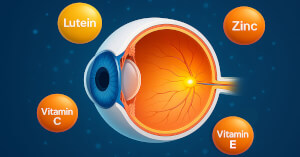
Zeaxanthin
Zeaxanthin is a plant pigment that accumulates in the eye and helps protect vision from light-induced damage.
Zeaxanthin is a yellow-orange carotenoid that, like lutein, accumulates in the macula of the eye. It is found in foods like corn, peppers, and goji berries, and plays a protective role in vision health.
This compound helps absorb blue light and neutralize free radicals, contributing to clearer, more resilient eyesight. It works synergistically with lutein to maintain retinal health and visual performance.
If preserving your eyesight is a priority, especially in a digital world, zeaxanthin might be worth considering as part of your daily regimen. It's commonly included in eye-support formulas along with other antioxidants.
Other names & forms of Zeaxanthin supplement : carotenoid zeaxanthin, vision carotenoid
Possible Benefits
Working alongside lutein, Zeaxanthin delivers focused eye health benefits and blue-light defense:
- Visual Defense: Supports retinal health and protects against glare and fatigue, aiding eye performance.
- Oxidative Protection: Contributes to free radical neutralization and may help promote age-related resilience.
- Complementary Action: Works in synergy with lutein for enhanced protection against light stress and eye strain.
Side Effects
Zeaxanthin is usually well tolerated, especially when taken in natural doses. However, as with any concentrated antioxidant, some users may notice mild effects when starting supplementation.
- Digestive upset, such as bloating or cramps
- Skin discoloration if taken in very high doses (harmless and reversible)
- Fatigue or headache in rare cases
Interactions
Possible interactions include:
- Cholesterol-lowering medications: Zeaxanthin is fat-soluble and may compete with absorption of lipid-based drugs.
- Lutein: Often combined for eye support; high-dose combinations may offer diminishing returns in some studies.
- Omega-3: May enhance bioavailability and support visual function synergistically with zeaxanthin.
Precautions
Before using zeaxanthin regularly, consider these precautions, especially if you have sensitivities or specific health concerns.
- People with carotenoid allergies: Zeaxanthin is a carotenoid and may not be well tolerated in rare allergic cases.
- Individuals with hypotension: Antioxidants may slightly lower blood pressure, so monitor if already on blood pressure meds.
- Pregnant or breastfeeding women: While found in food, supplemental forms should be cleared with a healthcare provider.
Studies
These studies provide scientific insights into Zeaxanthin benefits:
A 2021 RCT in older adults found that 2 mg/day zeaxanthin for 12 months increased macular pigment optical density and improved glare recovery .
A 2018 dose-response study demonstrated that 10 mg zeaxanthin daily doubled serum levels and enhanced contrast sensitivity in healthy subjects .
Disclaimer: This page is for educational purposes and does not replace medical advice. If you're pregnant, have a condition, or take medication, speak with a qualified professional.










